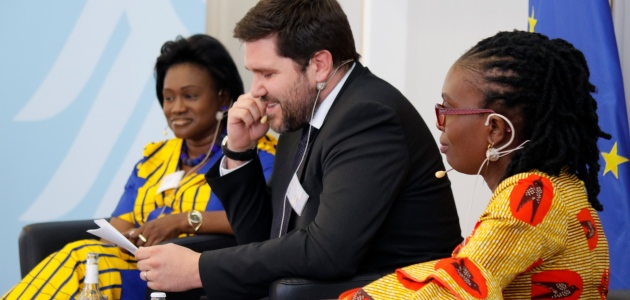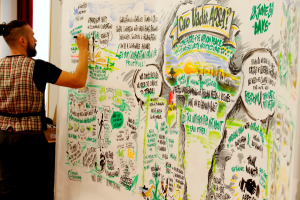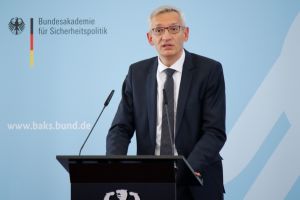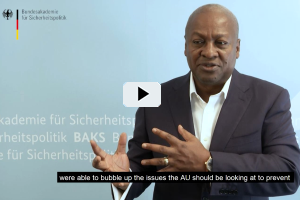Africa is ranking high on Europe's and Germanys political agendas. Against this backdrop, the Federal Academy for Security Policy and the GIZ held an international conference on the future of the African Peace and Security Architecture.

Michelle Ndiaye (Institute for Peace and Security Studies, left), Dr Emma Birikorang (Kofi Annan International Peacekeeping Training Center, right) discussed APSA's successes and failures. Dr Jan Grebe hosted the panel on part of the Federal Academy for Security Policy. Picture BAKS/Mochow
2017 was a special year for German Africa policy. More than once, public and political attention was focused on the African continent. The G20 summit in Hamburg, which for the first time in history featured Africa as a regional priority, and the Marshall Plan with Africa, presented in early 2017 by the Federal Ministry for Economic Cooperation and Development, are just two prominent examples. Some observers even felt inclined to proclaim a new “hype” about Africa. Regardless of whether one agrees with that kind of rhetoric, one thing is clear: Africa continues to be crucial for Europe and for Germany, and we have every reason to concern ourselves with our neighbour continent, especially from a comprehensive security policy perspective. Against this backdrop the Federal Academy for Security Policy and the German development agency GIZ set up an international conference on the future of the the African Peace and Security Architecture (APSA).
APSA – more than just another acronym
The President of the Federal Academy, Dr Karl-Heinz Kamp, opened theconference with a clear statement: ”Today, we are not talking about Africa, we are talking with Africa”. Reflecting this spirit, the conference speakers included, among others, German representatives and high-profile experts from various regional and government institutions as well as from research centres on the African continent. The conference held on 28 June was aiming to contribute to a deeper understanding of African peace and security issues with an emphasis on the role of APSA.
APSA was established by the African Union in collaboration with Africa’s Regional Economic Communities (RECs) in 2004. APSA is built around values, structures and decision-making processes relating to the prevention, management and resolution of conflicts in Africa. In other words: APSA is a strong commitment by African states to take on more responsibility in promoting peace and security across the African continent, and to ultimately contribute to the ambitious goal of “silencing the guns” and to realise a conflict-free Africa. So much for the theory and the ambitious claim, but what does reality look like? Where do we stand after some 15 years of APSA and, more importantly, what are the prospects for the future?
The formula to make further headway: flexibility and courage on both sides
According to John Dramani Mahama, the former President of the Republic of Ghana and now the Chairperson of the Tana High-Level Forum on Security in Africa (a kind of African counterpart of the Munich Security Conference), APSA creates an environment for Africa in which to unleash its own potential and to design new forms of partnership based on shared values. Africa is ready to be in the driver’s seat when it comes to actually dealing with the complex world of security issues on the continent. In addition to a stronger commitment to be shown by African countries, however, Mr Mahama also highlighted the importance of cohesive and consistent policies on the part of the international community. For example, efforts by African countries to strengthen fiscal sustainability of APSA instruments, such as import taxes, do not always encounter too much enthusiasm among Western partners who fear disadvantages for their own economies. Mr Mahama emphasised that the existing peace and security challenges in Africa should be seen both as the result of “internal contradictions” and “Africa’s relationship with the rest of the world”, especially its embeddedness in the global economy. Thus, while Africa is ready to live up to its own responsibility by, among other things, effectively using the APSA framework, addressing peace and security challenges in Africa “collectively” would offer the most promising approach.

Complexity turned palpable: major findings
of the conference were caught on paper
by a graphic recorder. Picture: BAKS/Mochow
The conference participants agreed that since the establishment of APSA, African and regional organisations have achieved significant gains in peace and security on the continent. African capabilities regarding the prevention, management and resolution of conflicts have grown substantially. At the same time, however, major shortcomings persist. For example, the African Standby Force, the APSA’s military and police arm, has yet to become fully operational after almost 15 years. In addition, there continue to be gaps in cooperation and coordination among all instruments under the APSA umbrella. The growing involvement of international partners prompts additional challenges. That is, while the AU and the RECs have gradually increased their joint efforts when intervening in violent conflicts – for instance, in 2015, the AU headed Peace Support Operations in Somalia, Lesotho and Darfur – external actors and partnerships, especially with the United Nations and other global players, complicate the overall picture and make it even more difficult for APSA to lead the way.
In addition, the birth of new institutional arrangements like the Multinational Joint Task Force, set up in 2012 to oppose the Boko Haram insurgency in the Lake Chad Basin region, or the G5 Sahel Joint Force that was established in 2017 to combat terrorism, drug and human trafficking in the Sahel region, illustrate the ongoing in-depth transformation of practices of conflict management in Africa. „Ad-hoc mechanisms and sub-regional task forces are operating in the same theatre,” said Dr Emma Birikorang from the Kofi Annan International Peacekeeping Training Centre. She and Michelle Ndiaye from the Institute for Peace and Security Studies of the Addis Ababa University in Ethiopia talked about the success and failures of APSA. They agreed that it would also be important to better connect APSA and its instruments with broader initiatives focusing on governance issues.
Germany – a reliable partner in APSA

State Secretary Martin Jäger (BMZ) pledged "more reliable and more substantial support for peace and security” by the Federal Government.
Picture: BAKS/Mochow.
Another crucial question of the conference was: How can Germany contribute to APSA’s stability and help master its various challenges? According to Martin Jäger, State Secretary of the German Federal Ministry for Economic Cooperation and Development (BMZ), the German government aims to expand and further deepen its partnership with Africa, including “more reliable and more substantial financial and strategic support for peace and security.” Mr Jäger noted that since 2006, the BMZ alone has provided about 130 million euros to APSA and the RECs.
Strengthening the capacity to recognise potential conflicts at an early stage, designing appropriate measures to combat them as well as bolstering resilience and improving resource management are among the priority areas of German support for the years to come. Mr Jäger also made an explicit reference to the Marshall Plan with Africa, which “has a clear vision of how Africa, the AU and the RECs should be capable of solving conflicts and crises by themselves.” One of the preconditions is strong and efficient institutions. In addition, Mr Jäger put a particular focus on the nexus, or reciprocity, between security and development. Without a minimum of security, he said, even the most devoted development efforts were doomed to fail. Likewise, we can hardly expect lasting security without sustainable development. In this context, Mr Jäger also highlighted the need for a modus operandi that clearly goes beyond ministerial confinements, adding that we “need a comprehensive approach for the connected world we live in.“
At the end of the day, the conference produced three main conclusions: First, while APSA continues to have notable shortcomings now, and, more importantly, in the long run, it does mark a major paradigm shift turning the former principle of non-interference into a joint credo of non-indifference. This implies a fundamental change and a profound statement by African countries about their willingness to assume responsibility for the pressing security questions at home. Second, since the inception of APSA, not only the world at large, but especially the security environment on the African continent has become even more complex and challenging. This requires even stronger efforts in terms of national, regional and international cooperation and coordination, in addition to a genuine African commitment. Third, shedding light on African challenges and jointly dealing with the multitude of pivotal future issues is anything but simply following a “hype”. Rather, it is indispensable, because, in the end, stability in Africa also means stability in Europe.
Authors: Martin Schuldes and Philipp Fritz

